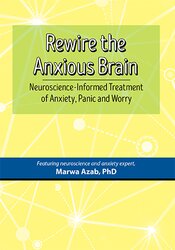

Watch neuroscience and anxiety expert, Marwa Azab, Ph.D., and learn her keys for successful anxiety treatment. Dr. Azab integrates brain-based strategies for calming the anxious mind with client communication techniques that motivate change in your clients. Marwa’s approach promotes adherence to treatment and strengthens the therapeutic alliance – which is essential when working with anxious, worried, traumatized, or obsessive clients.
Dr. Azab will give you proven tools and techniques to:
This transformational workshop recording will put the power of neuroplasticity to work for you and your anxious clients!
This online program is worth 6.0 hours CPD.
| File type | File name | Number of pages | |
|---|---|---|---|
| Manual - Rewire the Anxious Brain (3.64 MB) | 118 Pages | Available after Purchase |

Marwa Azab, PhD, teaches for the psychology and human development departments at Cal State University, Long Beach, (CSULB). She has also taught for the biology department at University of California, Irvine (UCI). Marwa studied psychology for many years and completed a master’s in counseling. She has facilitated many groups such as anger management, stress management, interpersonal communication and many others for patients suffering from a variety of mental disorders. After many years of addressing human behaviors from a psychological perspective, she realized that there were blind spots that needed to be satiated from complementary fields. Thus, she completed a PhD in biological sciences with emphasis on neuroscience. Marwa started life coaching utilizing an interdisciplinary approach that intersects psychology, biology and genetics.
Marwa is a sought after international public speaker who is invited to speak on a variety of interdisciplinary topics, including three TEDx talks. She recently published her first book titled, Anxiety Disorders: New Science on Mind-Body Connections and Healing and blogs for Psychology Today, her blog is called "Neuroscience in Everyday Life". You can connect with her on her Facebook page: www.facebook.com/DrMarwaAzab.
Speaker Disclosures:
Financial: Dr. Marwa Azab has an employment relationship with California State University and receives royalties as a published author. She receives a speaking honorarium and recording royalties from Psychotherapy Networker and PESI, Inc. She has no relevant financial relationships with ineligible organizations.
Non-financial: Dr. Marwa Azab writes a blog for Psychology Today called "Neuroscience in Everyday Life."
| 5 |
|
| 4 |
|
| 3 |
|
| 2 |
|
| 1 |
|
Satisfaction Guarantee
Your satisfaction is our goal and our guarantee. Concerns should be addressed to info@pesi.co.uk or call 01235847393.
Please wait ...